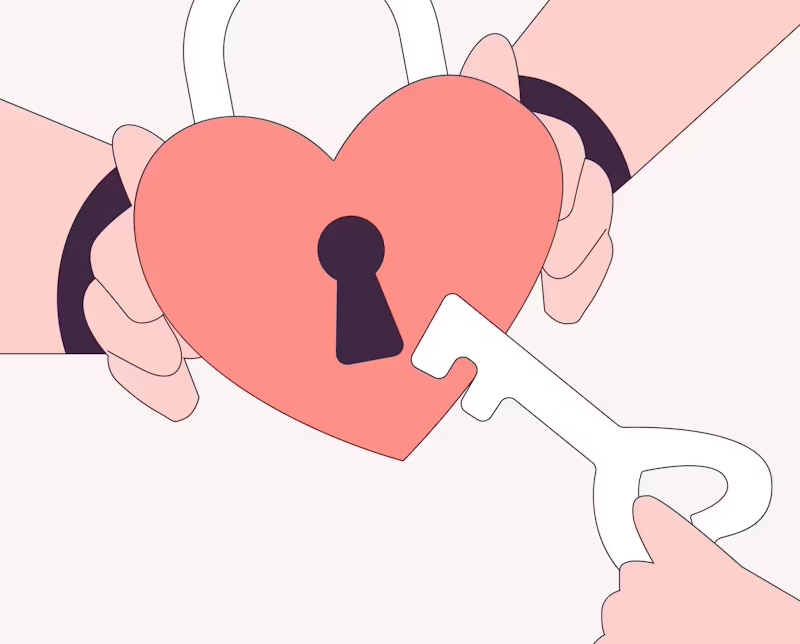Addressing Your Children’s Reactions to News of Your Divorce

Telling your children about your divorce can be one of the most difficult conversations you’ll face as a parent. It’s crucial to approach this discussion with empathy, careful planning, and clear communication to help them process the news and feel supported.
What Exactly is Codependence?

Codependence is a dysfunctional pattern of behavior in which one person excessively relies on another for emotional, psychological, or even physical support, often at the expense of their own needs and well-being.
Divorce and Grief: A Bumpy & Necessary Process

Divorce is often likened to grief—it involves losing a relationship, a shared future, and, sometimes, even a sense of self. The grieving process during and after a divorce can feel particularly intense, as it encompasses the loss of a partner, the ideal of what a family “should” be, and the dissolution of dreams and expectations.
Domestic Abuse & Violence Resources

Seeking support for domestic abuse can feel overwhelming, but you are not alone. Numerous organizations offer confidential help, safety planning, and legal resources to ensure you feel safe and supported. From 24/7 hotlines to shelters, therapy, and legal aid, there are many ways to get assistance. Whether you need immediate help or long-term support, these trusted resources can guide you toward safety and healing.
Helpful Phrases for Addressing Your Friends’ Initial Reactions to News of Your Divorce

Telling friends about your divorce can feel daunting, but with thoughtful preparation and empathy, you can navigate the conversation with confidence. The way you share the news sets the tone for their response and future support. Onward’s expert guidance provides helpful scripts to express your emotions, set boundaries, and encourage understanding. Whether you need reassurance, space, or simply a listening ear, these conversation starters help you communicate with clarity and grace.
Relationship Reflection and Renewal Exercise

Reflect on your past relationship to gain clarity and heal. This exercise guides you to examine both the positives and negatives of your experiences—from identifying early warning signs to expressing unsaid thoughts—all with a healthy dose of self-compassion. With a little peace, quiet, and honest introspection, you’ll uncover valuable insights that pave the way for healthier, more fulfilling relationships in the future.
Setting Boundaries with Others

Setting boundaries is essential for emotional well-being, especially during a divorce. Clear boundaries help manage stress, reinforce identity, and promote healthier relationships. To establish them, identify your needs, communicate clearly, and remain consistent. Expect resistance but stay firm, prioritize self-care, and seek support when needed. Learning to say no and adjusting boundaries over time ensures long-term emotional balance and personal growth.
Understanding the Personalities and Negotiation Styles of Family Law Attorneys: Choosing the Right Fit for Your Divorce

Selecting a family law attorney involves understanding their personality and negotiation style. Some prioritize collaboration, while others take a more aggressive or litigation-driven approach. Detail-oriented attorneys focus on facts, while compassionate ones provide emotional support. Strategic lawyers find creative solutions, and versatile ones adapt their approach as needed. Choosing an attorney whose style aligns with your goals ensures effective representation and a smoother legal process.
What are the Pros and Cons of Changing your name after a Divorce?

Changing your name after divorce can be empowering, offering a fresh start and symbolic detachment. However, it comes with administrative hassles, costs, and potential impacts on professional life and family dynamics. Weigh the pros and cons carefully to decide what’s best for your future.
What Is a Divorce Mediator and Should I Hire One?

Thinking about divorce but dreading the courtroom drama? A divorce mediator might be the solution you need. Unlike a judge, a mediator helps couples negotiate key issues like property division, child custody, and support—without making decisions for you. It’s a cost-effective way to reduce conflict and keep control over your divorce settlement. But is it right for you? Discover when mediation works best and when you might need a different approach.
